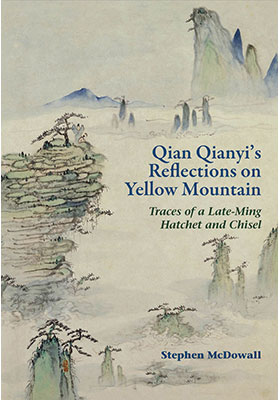Qian Qianyi’s Reflections on Yellow Mountain
Traces of a Late-Ming Hatchet and Chisel
(錢謙益的黃山反思:晚明時期的遊記)
ISBN : 978-962-209-084-2
November 2009
236 pages, 7″ x 10″
- HK$350.00
Qian Qianyi’s Reflections on Yellow Mountain is a close examination of the practice of travel writing in seventeenth-century China, presenting a new reading of the youji genre that combines meticulous research and an innovative theoretical position. Taking the ‘Account of My Travels at Yellow Mountain’ by the noted poet, official and literary historian Qian Qianyi (1582–1664) as his focus, Stephen McDowall departs from traditional readings of youji in secondary scholarship, by reading the landscape of Qian’s essay as the product of a complex representational tradition, rather than as an empirically-verifiable space. Drawing from a broad range of materials including personal anecdotes, traditional cosmographical sources, gazetteers, Daoist classics, paintings and woodblock prints, this book explores the fascinating world of late-Ming Jiangnan, highlighting the extent to which this one scholar’s depiction of Yellow Mountain is informed, not so much by first-hand observation, as by the layers of meaning left by generations of travellers before him. Qian Qianyi’s Reflections on Yellow Mountain includes the first complete English-language translation, and represents the first full-length critical study of Qian Qianyi’s account to appear in any language. The ideas it explores not only make this book essential reading for scholars and students of late imperial Chinese history and literature, but should also offer thought-provoking new insights for anyone interested in travel writing, human geography, the sociology of tourism or art and visual culture generally.
“This is a meticulously researched monograph of impeccable scholarship. It is the most thorough study of a Chinese travel diary I’ve ever seen: rich in its insights, measured in its claims, punctilious in its philology, the book provides an invaluable insight into late Ming culture, and illuminates, as few studies have before, the genre of travel writing.” —Eugene Eoyang, Lingnan University
“McDowall’s conceptual rethinking casts important new light on the Chinese ‘travel journal’, a genre of Chinese belles-lettres that has been unjustly neglected. His subtle, many layered interpretation, in its broadly conceived cultural reading of the youji, goes far beyond the simplistic and ‘objective’ framework of earlier writers. He argues powerfully that the travels are spiritual journeys, and the landscapes through which they take place are spiritual topographies.” —John Minford, Australian National University

